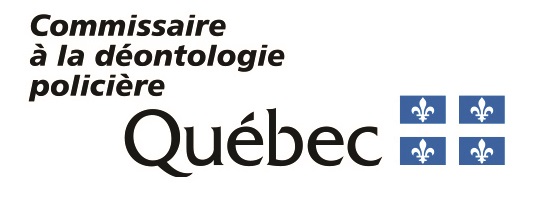File a complaint
Citation
Citation
The Decision to Cite
When cited to appear before the Comité de déontologie policière, police officers and other peace officers are required to respond to the Comité de déontologie policière on the counts of citations related to the breaches or omissions of which they are accused :
- When at the end of his investigation, the Commissioner considers that the evidence justifies it;
- or if, following a request for review, the Comité de déontologie policière orders the Commissioner to file a citation.
The Commissioner also cite to appear before the Comité de déontologie policière any police officer or other peace officer found guilty of a criminal offense constituting a breach of the Code of Ethics of Québec Police Officers (after a final decision by a Canadian court).
The Citation
The citation is a document that describes the alleged breaches. It indicates the articles of the Code of Ethics of Québec Police Officers of which one alleges the violation, as well as the circumstances of time and place surrounding these acts.
The Comité de déontologie policière and the Hearing
When police officers or other peace officers are required to answer for breaches or omissions of which they are accused in a citation filed by the Commissioner, the Comité de déontologie policière holds a hearing. This is public, unless the Comité orders it closed.
At the hearing, a lawyer for the Commissioner must provide proof of the alleged conduct against the police officer or peace officer according to the rule of preponderance.
The Comité de déontologie policière offers police officers and other peace officers the opportunity to have their defense heard before an accessible, independent, impartial and specialized body in matters of police ethics.
The Decision of the Comité de déontologie policière
After deliberation, the Comité renders a written decision:
Decision on the merits. The Comité de déontologie policière decides if the conduct of the police officer or other peace officer constitutes a breach of the Code of ethics of Québec police officers.
Decision on penalty. When the conduct of the cited police officer or peace officer is deemed derogatory, the Comité allows the parties to be heard. Subsequently, they impose an appropriate sanction.
In determining the penalty, the Comité considers the seriousness of the conduct considered derogatory by taking into account all the circumstances and the content of the ethical file of the police officer or other peace officer.
For each of the derogatory acts, the Comité imposes one of the following penalties :
- a warning;
- a reprimand;
- a blame;
- a suspension without pay (for a period not exceeding 60 working days);
- a demotion;
- dismissal;
- the inability to perform peace officer duties (for a period not exceeding 5 years), when the police officer or other peace officer has resigned, has been dismissed or has retired.
The Comité's decisions are forwarded to the complainant, to the police officer or peace officer cited, as well as to the director of the police force (or employer of the peace officer) concerned. They are also made public.
<< 3. Conciliation 5. Review for Request >>
File a complaint
Need help?
If you want more information or if you need help drafting your complaint, you can contact us.
deontologie-policiere.quebec@msp.gouv.qc.ca
